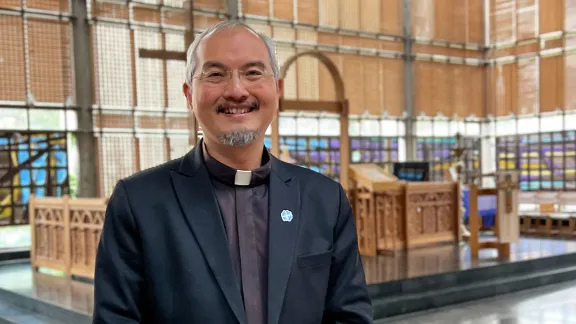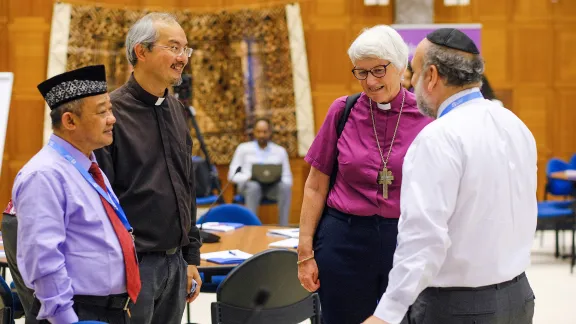Church planter, Christian blogger and interfaith pioneer in his native Malaysia were among the most formative experiences for Rev. Dr Sivin Kit on his journey to leadership with the LWF in Geneva.

Rev. Dr Sivin Kit in the chapel of Geneva’s Ecumenical Center. Photo: LWF/S. Kit
Rev. Dr Sivin Kit reflects on his journey from local pastor to head of LWF’s Department for Theology, Mission & Justice
(LWI) - Malaysian theologian Sivin Kit was just three and a half years old when he first encountered The Lutheran World Federation (LWF) on a flight from Kuala Lumpur to London. It was the mid-1970s and his father was studying in the United Kingdom, partially supported by an LWF scholarship. The organization also paid for plane tickets for him and his mother, allowing them to remain together as a family. Kit still has the receipt for those tickets, a small but significant step on the journey towards the job he holds today as interim director of the Department for Theology, Mission and Justice.
As the son of first-generation Lutherans, with grandparents who emigrated from China, Kit has always lived in a multi-ethnic, multi-religious environment. At primary school in England, his best friends were a Vietnamese refugee, an Indian migrant and a young British boy. At high school back in Malaysia, he was, for a year, one of five who were not Muslims. Fostering interfaith relations was a way of life, long before it became a professional and pastoral priority.
In England, Kit temporarily lost touch with his Lutheran roots – his late uncle Justus Koo had been one of the first pastors to be ordained with the Lutheran Church in Malaysia. “We became unchurched,” he says. Returning to his native country, he found his way back, firstly through the Pentecostal church and later in the Lutheran charismatic renewal movement which “helped me appreciate the richness of experience for my faith.”
Public theology and interfaith relations
Working in youth and student ministries in his teenage years “ignited a sense of calling to become a pastor,” Kit recalls, leading to studies at Malaysia Theological Seminary and ordination in 2003. Planting a new congregation in Kuala Lumpur called Bangsar Lutheran church, or ‘The Father’s House’, was a “life-changing experience,” he continues, as he led a growing group of mostly young adults seeking to find a voice in the public square at a time of rising Muslim-Christian tensions and political changes.
Under Kit’s leadership, the church became known as a strong advocate for social justice and a safe space for people of different faiths to come together and engage in dialogue around pressing issues of the day. At a time of rapid technological change, he was one of the pioneering Christian bloggers in Malaysia sharing precious lessons about faith, ministry and life with a wider public outside of the church.
“I encountered all the seeds of public theology as a local pastor and developed a more holistic understanding of mission,” Kit explains. He spent over a decade there, before moving to Norway for a PhD in religion, ethics, and society. “This was a formative time for me, which offered an opportunity to view my roots from a different perspective,” he adds. He returned home to serve as a lecturer and director of a center for religion and society at the seminary in Seremban for a further four and a half years. During this time, he was also involved in national civil society discussions about the role of religion for the common good in a multireligious Muslim-majority context.

Rev. Dr Sivin Kit with Christian, Jewish and Muslim partners at a 2022 international interfaith conference in Geneva entitled ‘Welcoming the Stranger, Shaping the Future’. Photo: LWF/M. Renaux
Invitations to participate in an interfaith consultation in Hong Kong (2015) and a theological conference at the Wittenberg Center in Germany (2018) brought Kit back into the orbit of the global communion of churches, more than 40 years on from his initial contact with the LWF. He moved to Geneva - with his own family this time – to take up a job, initially as Program Executive for Public Theology and Interfaith Relations, before starting in his new post at the beginning of 2023.
“It is exciting to see the larger picture and the broader vision of what it means to be a Lutheran, to be a Christian in a world that is struggling with change, conflict and climate crisis,” he reflects. “Before, I was a local and a national church leader, but now I am learning to see the global connections and the most exciting part of my new job is the dynamism between local and global.”
Maps (both mind maps and geographical ones), space and the dynamics of movement hold a particular fascination for Kit, alongside his passion for digital technology and social media. “God is a God of movement: our faith is all about the movement of the Spirit among people, even if they don’t necessarily articulate it in that way,” he says.
When we are liberated by God’s grace, that gives us movement and forward direction.
– Rev. Dr Sivin Kit, Director Ad Interim of LWF’s Department for Theology, Mission and Justice
“Our theological vision is one of hope, where God will wipe away every tear and that hope informs and inspires us, it pulls us forward, out of ourselves,” Kit adds. “As Lutherans, we define sin as the self [being] curved inwards, but when we are liberated by God’s grace, that gives us movement and forward direction. I see us practicing this kind of theology in all our theological, leadership, diaconal and advocacy work.”
The biggest challenge and task that Kit sees in his new role is “to continue working with the synergy of theology, mission and justice, which is fundamental to the department” he leads. This includes preparations for the Thirteenth LWF Assembly coming up in September in Krakow, Poland. “There are a lot of expectations, but the fact of being able to meet together is something to be really thankful for in the wake of the COVID-19 pandemic,” he says.
“It is also a time of discernment as we ask what it means to be ‘One Body’, inspired by the One Spirit? There are so many priorities and our work is to facilitate, to encourage and enable others to use their gifts and talents to discover what is at the core. We may all have distinctive contributions,” Kit concludes, “but that doesn’t mean being divisive, rather it means seeking to be united in a common vision as we move forward in hope.”


